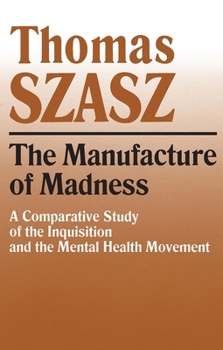Manufacture of Madness: A Comparative Study of the Inquisition and the Mental Health Movement
Select Format
Select Condition 
Book Overview
Every age, labels others to a particular fate, such as the witch consigned to the fire. The priest has now been replaced by the psychiatrist and this text examines the role of medicine as a more... This description may be from another edition of this product.
Format:Paperback
Language:English
ISBN:0815604610
ISBN13:9780815604617
Release Date:April 1997
Publisher:Syracuse University Publications in Continuin
Length:406 Pages
Weight:1.10 lbs.
Dimensions:0.9" x 5.6" x 8.0"
Customer Reviews
4 ratings
Mental Illness: A Study in Scapegoating.
Published by Thriftbooks.com User , 20 years ago
_The Manufacture of Madness_ by right wing libertarian "anti-psychiatrist" Thomas Szasz is a comparative essay showing the similarity and growth of the "religion of mental illness" from the Inquisition, the persecution of heretics, and the days of witch hunting. Szasz contends that the idea of "mental illness" is in fact a category mistake involving a false notion of "illness". Much of this book is spent demonstrating how society in the form of the "mental health movement" seeks to root out dissenters and heretics in order to protect the reigning order (or to achieve a new scientistic based order controlled by doctor-bureaucrats - the modern day utopia of "the Brave New World"). Szasz finds notable similarity between the mental health movement and the Inquisition and persecution of witches (including the comparison made between the _DSM_ and the notorious witch hunter's manual _Malleus Maleficarum_). Szasz observes that society has always had certain individuals who defied convention and thus posed a threat to the reigning order. These individuals (mostly eccentrics, romantics, dreamers, dissidents, and heretics) were often rounded up by society's "protectors" and then identified as the "inner enemy" and thus conveniently "scapegoated". Tradition held that the scapegoat served as the embodiment for all of the sins within the given enclosed society. Thus, for Szasz, the so-called mentally ill individual is identified as an eccentric by the modern day "therapeutic state" and deemed to serve as the scapegoat for the sins of a given society through the process of forced confinement. Those who fall too far to the right or left of the bell curve are arbitrarily deemed "abnormal" after some cutoff point and therefore forcibly confined, their civil liberties denied to them. Often such an individual is a poor man or woman who is eccentric and lives alone. Such a person makes an easy target for the statist "thought police" of the world of 1984. Despite their denials of their illness, such individuals are arbitrarily declared ill and confined. Nearly all categories within the _DSM_ have clear reference to class, race, and sex biases. Nearly all categories can serve conveniently as a tool of the wealthy and dominant elite against the impoverished classes. While society may deny civil liberties to certain individuals, the real problem is that it has failed to provide a way to fully integrate such eccentric individuals into its dominant structures. Thus, Szasz seeks to re-politicize a process that is often entirely de-politicized and defined in terms of illness. The first half of this book offers a comparative survey of mental illness and the mental health movement and the persecution of witches and heretics. One may consult the works particularly of Norman Cohn, a historian who deals with the medieval period and some of the mass hysteria that existed at that time, for a detailed examination of this topic within Europe particularly. However,
brilliant humanist writer
Published by Thriftbooks.com User , 21 years ago
a penetrating and enlightening analysis of things that make men crazy, namely power and control.Thomas Szasz is a real hero of consciousness, freedom and intelligence who is never afraid to disclose the information that hurts the orthodoxy where it counts.This work, like so many of his others, is a shining example of the great American libertarian vanguard.Enjoy.
'mentally ill' is often another term for 'not like us'
Published by Thriftbooks.com User , 22 years ago
although thomas szasz was wrong to say that mental illness is totally a myth and that there is no reason to believe that there are people with mental disorders as debilitating as physical disorders, he certainly was right in attacking the mental health system for its often dehumanizing effects on people who simply have not been 'encultured' enough for the comfort of those around them. some of his work can be dismissed as dated anti psychiatry extremism, but some of it is absolutely relevant and as important today as it was when published
Attacking the Disease Model
Published by Thriftbooks.com User , 24 years ago
The Manufacture of Madness is a fine historical analysis of psychiatry and the mental health movement, drawing comparisons between the medical establishment's treatment of deviants as mental patients and the Inquisition's treatment of deviants as witches. Radical, perhaps, although it must have seemed much more radical in 1970, when first published. Dr. Szasz knew his material well, having worked for twenty years as a psychiatrist in this country prior to writing the book.His views were considered heretical by his colleagues (an irony that he makes much of) because he argued, quite strongly, that institutional psychiatry is dehumanizing both to patients and society as a whole because it deprives these people of all rights, treats them as objects to be repaired, and submits them to cruel tortures in the name of therapy. He went on to declare that mental illness itself is a myth; there has never been a scientific basis for treating social and behavioral deviance as stemming from the same causes as physical illnesses, nor reason to try to cure it. His central thesis is that institutional psychiatry fills the same role in modern times as the Inquisition did until only a few hundred years ago--a system of control and suppression of social deviants.





